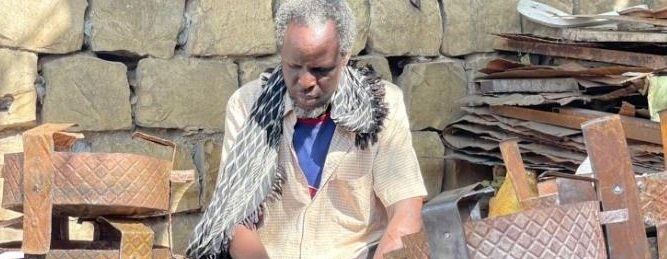(ERGO) – Ibrahim Mohamed Yusuf, a skilled artisan who makes charcoal stoves in the southern Somali town of Baidoa, is out of work due to a widespread shift from charcoal to gas for cooking in local households.

Ibrahim says that after 15 years as a skilled artisan he has now become a beggar, relying on friends and acquaintances and sometimes asking for food from neighbours. He was earning $10-15 a day selling stoves that used to support his family of 10.
“I have been unemployed for three months, and during this time, my family has faced serious food insecurity,” Ibrahim explained. “We can no longer afford to eat three meals a day. It’s been very difficult for us. We survive on whatever we can get from friends and neighbours.”
Ibrahim is burdened with debts of $250 including overdue rent and food that he took on credit for his family. Despite his best efforts, he has been unable to find alternative work. He considered learning tailoring, but says he lacked the funds to pay for training.
At home, Ibrahim has around 10 unsold charcoal stoves he made that he can’t sell. “All of our customers have switched to gas. A company brought in Baby Gas here, and people now refill gas cylinders instead of using charcoal. Making stoves was the only thing I knew how to do,” he told Radio Ergo.
Mohamud Idow Hassan, another artisan, ran a small shop selling charcoal stoves, but after two months without a single sale he was forced to close his business. His family of nine now faces extreme poverty.
“I never prepared for this. I didn’t expect the stove business would collapse. It’s been very difficult, and I don’t know how I can survive or support my family now,” Mohamud said.
Mohamud owes $120 to a local shop for food supplies. He used to make at least $20 a day from stove sales, which was sufficient to meet his family’s needs. Now, he feels hopeless about the future.
One of the local householders who has shifted from charcoal to gas as a cooking fuel is Hamdi Ali Osman. She describes gas as more convenient and cost-effective compared to charcoal.
“Buying charcoal was very time-consuming and costly. If you bought charcoal today, it wouldn’t even last a month. With gas, we save double the amount we used to spend on charcoal,” Hamdi explained.
Hamdi uses one gas cylinder a month, which has significantly reduced her household expenses. She advocates for others to make the switch for financial and practical advantages.
Despite affecting the livelihoods of artisans like Ibrahim and Mohamud, the shift to gas may be a significant factor in contributing to environmental protection. The reduced demand for charcoal is easing pressure on forests in South West State, where deforestation has long been a concern.
Their stories highlight the complex intersection of economic and livelihood shifts and environmental change.
Source: Radio Ergo

Leave a Reply